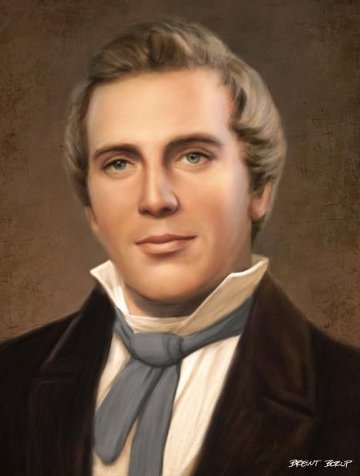
(by Brent Borup)
by John P. Pratt
21 Oct 2016, 1 Light (SR), 1 Creation (M, UM)
©2016 by John P. Pratt. All rights Reserved.
| 1. Like Unto Moses |
| 1.1 Two Messiahs |
| 1.2 Two Lawgivers |
| 1.3 Face to Face with God |
| 1.4 Two Spokesmen |
| 2. Known For Good and Evil |
| 2.1 Moses |
| 2.1.1 Murder? |
| 2.1.2 Illegal Marriage? |
| 2.1.3 Life Threatened by Angel |
| 2.2 Joseph Smith |
| 2.2.1 Murder? |
| 2.2.2 Illegal Marriage? |
| 2.2.3 Life Threatened by Angel |
| 2.3 Like Unto Abraham? |
| 3. Both Atone for Sins |
| 3.1 Sacrificial Bull |
| 3.2 Daily Sacrificial Lambs |
| 4. Conclusion |
| Notes |
 |
And yet Joseph Smith has been an enigma. The angelic prophecy that Joseph's "name should be had for good and evil among all nations" (JSH 1:33) was truly fulfilled. He was accused of adultery by his Assistant President and of attempted murder by a former counselor in his First Presidency. He was imprisoned multiple times. The last time was after he signed an order to destroy a press which was about to expose the involvement of many Church leaders in polygamy. That newspaper was run by another former counselor in the First Presidency and hence privy to much inside information. That action led to the Prophet's martyrdom. What other prophet has been lauded for doing so much good and also accused of doing so much evil?
This article considers the controversial nature of the Prophet Joseph Smith and compares his life to that of Moses, showing how it fulfilled a prophecy by Moses about one like unto himself. It will also consider symbolism of Joseph in the constellations and also the day of his martyrdom on a summer equivalent of the Hebrew Day of Atonement. It concludes that Joseph was indeed a noble prophet who is still the head of this dispensation, from whom the keys of the kingdom will not be taken, even after his death (D&C 90:3).
 |
Moses prophesied of one who would come after him who should be hearkened to:
The Lord thy God will raise up unto thee a Prophet from the midst of thee, of thy brethren, like unto me; unto him ye shall hearken; — Deut. 18:15.
We have at least three scriptural witnesses that this prophecy refers to the Savior Jesus Christ, the strongest being from the Savior himself (3 Nephi 20:23, Acts 3:22, 1 Nephi 22:20-21).
But there is another who is said in scripture to be "like unto Moses": the Prophet Joseph Smith. In the first chapter of the Book of Moses, which is apparently a lost or deleted introductory chapter to the Book of Genesis, the Lord states that in a day when the Bible is not esteemed, that one like unto Moses would restore it (Moses 1:41). That was done by Joseph Smith. Moreover, one prophecy of Joseph of Egypt states that the Lord would raise up a great seer (Joseph Smith) from among his descendants who would be great "like unto Moses" (2 Nephi 3:7,9).
In what ways was the Prophet Joseph Smith like unto Moses? Let's look at some similarities between these two giants among men.
Both Joseph Smith and Moses have been identified in my work as two of the chief angels of God, often called archangels. Moses was identified with the angel Raguel and Joseph with Phanuel.[2] A case could be made on that point alone that they are similar to each other. However, they do have more things in common with each other than with the other chief angels such as Adam (Michael), Noah (Gabriel), and Enoch (Raphael).
In the rich imagery of the sacred constellations, there is one bright star among the four which are called the "Four Corners of the Earth", which clearly represents Joseph Smith. It is Aldebaran, the bright "Eye of the Bull". Each of the twelve zodiac constellations represents one of the twelve tribes of Israel. It is the Bull (Taurus) which represents the tribe of Joseph (Deut. 33:17). The one bright star in the constellation of the Bull is blazing red Aldebaran, located at the eye. The Book of Enoch explains that each of the bright stars represents one of God's servants. The eye represents seeing and in my work it has been proposed that Aldebaran represents Joseph the Seer (one who sees) of the tribe of Joseph. Joseph is also represented by the bright star Pollux in the constellation of the Twins (Gemini). Pollux was also the name of the twin who was a wrestler, just as Joseph Smith was a champion wrestler.
Moses is also represented by two bright stars: Spica in the zodiac constellation Virgo and also Arcturus in the Herdsman. Moses spent many years as a herdsman of flocks of animals and then later as the shepherd of the children of Israel.[3] These similarities of Moses to Joseph Smith are related to their both being among the seven angels, each of which is associated with seven different constellations.
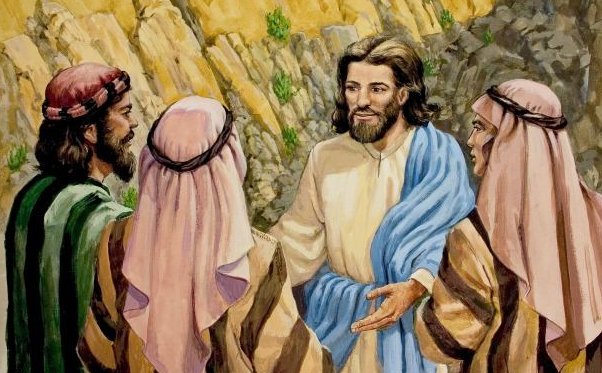 |
Where did the tradition come from about the Messiah ben Judah and the Messiah ben Joseph? Why are both lumped together as if they are of comparable stature when Jesus was the Son of God, indeed the very God of Abraham, Isaac, and Jacob who would come down and take upon himself flesh? How did the so-called Messiah ben Joseph come to be associated with Him and even be referred to as a "messiah"?
Immediately after the prophecy of the Messiah ben Judah qutoed above, there is a prophecy of another great prophet:
According to all that thou desiredst of the Lord thy God in Horeb in the day of the assembly, saying, Let me not hear again the voice of the Lord my God, neither let me see this great fire any more, that I die not.
And the Lord said unto me, They have well spoken that which they have spoken.
I will raise them up a Prophet from among their brethren, like unto thee, and will put my words in his mouth; and he shall speak unto them all that I shall command him.
And it shall come to pass, that whosoever will not hearken unto my words which he shall speak in my name, I will require it of him. — Deut. 18:18-19[5]
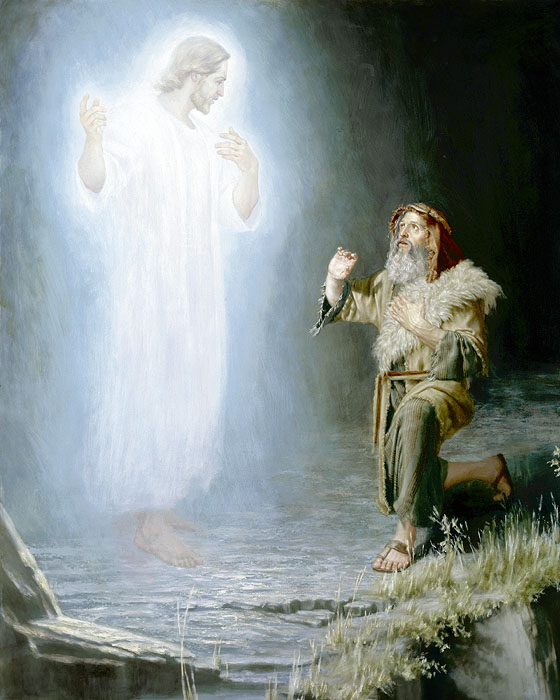 |
This prophecy is almost identical to the one preceding it which referred to the Savior, but there are subtle yet important differences in wording which show that it is not simply a repetition of the first prophecy. The first prophet will appear among them, that is, he will descend from the main body of Israelites led by Moses. The second prophet on the other hand will appear among their brethren.
But wait, weren't all of the tribes of Israel there with Moses? To which of their "brethren" did the Lord refer? Remember this was long before David, long before Israel split into two parts, way before the lost tribes got lost many centuries later. So who would they have understood to have been their brethren?
The Book of Jasher, which appears to be a reliable source of ancient history,[6] records that a few decades before Moses delivered the children of Israel from Egypt that 30,000 from the tribe of Ephraim decided to leave by themselves because they had calculated that the prophesied time of bondage had expired (Jasher 75:1-2). It states that ten of them returned to the main group reporting that all except for them had been killed in a war. But what if they did not all die and some escaped?
There is another interesting account of some preaching of the Apostle Paul which did not get included in the Bible. It tells of a mission of Paul to Great Britain. It notes that while he was there that some Druid priests explained to him that they were descendants of Israelites who had fled the bondage of Egypt. There is much evidence that there are a lot of descendants of Ephraim in Great Britain, mostly from the tribes scattered after about 720 BC escaping the Assyrian captivity. But those Druid priests seemed to be telling another story, that of having escaped the Egyptian bondage rather than the Assyrian captivity. If so, the possibility arises that they are descendants of some of the tribe of Ephraim who made it to safety. Putting these two extra-Biblical accounts together is rather speculative but it is what seems to make the most sense for a prophecy about a prophet coming from the brethren of those to whom Moses was speaking. Who else would the listeners of Moses identify with their brethren? This could be the origin of identifying that prophet as Messiah ben Joseph.
Here is the account from the Lost Chapter of Acts of the Apostles (also called the Sonnini manuscript):
13. And it came to pass that certain of the Druids came unto Paul privately and showed by their rites and ceremonies they were descended from the Jews which escaped from the bondage in the land of Egypt, and the Apostle believed these things, and he gave them the kiss of peace.[7]
It is believed by some that the ancient Britons (now called Welsh) arrived around 1100 BC being said to have migrated through Italy from Sparta, being Israelites. They founded London which was first called New Troy. That was long before the Celts who were most likely from the scattered tribes of Israel, who arrived around 600 BC. Then many Jews came fleeing Jerusalem before it fell in AD 70. Then the Anglos, Saxons, and others conquered them around AD 600 and they too were most likely from the scattered tribes of Israel. If so, there is much blood of Israel and especially Ephraim in the British Isles. The Lord implies there are many descendants of Joseph of Egypt in Great Britain because He explicitly stated that John Johnson, at whose home Joseph Smith stayed while laboring on his new translation of the Bible, was his descendant (D&C 96:6-7).
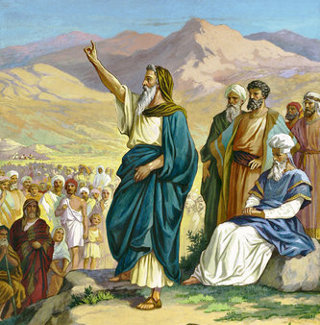 |
There is another difference between the two prophecies. The first prophecy of Christ instructs the people: "unto him ye shall hearken". That is an unconditional statement. The Messiah ben Judah would be the Son of God. He would be spotless and not make any slips of the tongue. Every word which would proceed from His mouth should be heeded and obeyed.
On the other hand, the words of God would be put into the mouth of the Messiah ben Joseph, but it is only those words which need to be obeyed. The verses following that prophecy state that words which are not from God can be detected because those prophecies may not be fulfilled. Such words do not need to be followed.
Remember the context of this last prophecy. It is God's solution for a hardheaded people who do not want to speak to God directly. He will send them two prophets. The first is actually their God Jehovah disguised as a man. The second is a man to whom they are also required to hearken, so long as he speaks the words which God puts into his mouth.
The Prophet Joseph taught this principle clearly. He said that "a prophet was a prophet only when he was acting as such."[8] If so, then when he is not speaking the words of God, he need not be heeded.
The point is that God's people are supposed to be maturing spiritually. The Savior can be trusted to be followed in every word that proceeds out of His mouth because He is Jehovah (Matt. 4:4, quoting Deut. 8:3). But that is not true of the Messiah ben Joseph. His followers are expected to know from the gift of the Holy Ghost which of his words are true and which are not. They only need follow the words from God, such as the entire Book of Mormon, which was translated by the gift and power of God.
 |
Similarly, the Lord told the Prophet Joseph that after the saints moved to Ohio that He would reveal His law to them (D&C 38:32). This was extremely important because they already had the Book of Mormon which contains the higher law of the Sermon on the Mount that Jesus repeated nearly verbatim to the Nephites, even as He had delivered it in Jerusalem. One would think that higher law would be enough, as it is already very difficult to keep. But it was not enough; the Lord revealed a new law to His fledgling Church on 9 Feb 1831, less than a year after it was founded. It is now called D&C 42. Similarly, there have been many presidents of the LDS Church after Joseph Smith, but he has been the only lawgiver. Moreover, the Lord explicitly stated that Joseph received commandments "even as Moses" (D&C 28:2).
 |
Of course, one of the most famous things about Joseph Smith is that he claimed even as a teenager that he had spoken with God face to face. That is so unusual that his testimony was rejected by most, especially by preachers who had been taught that such was then impossible and hence it must be from the devil. But Joseph tenaciously stuck to his story until his martyrdom. That is a huge similarity between Joseph and Moses, which the Lord apparently referred to when He stated that His law would be given only through Joseph because he received it as did Moses.
 |
The purpose of the two spokesmen seems to be somewhat different. The Lord said He would give Moses his brother Aaron for a spokesman because Moses was "slow of speech" (Exo. 4:10,16).
On the other hand, the Prophet Joseph could speak well; he was given Sidney Rigdon as a spokesman for other reasons. One was to be a second witness to the truth. That is, the unlearned Joseph would speak by the Spirit and reveal truths on the spot as he spoke. Then Sidney, who was an accomplished preacher, would arise and confirm everything that Joseph said by showing it was actually doctrine from the Bible. New revelations might add details and new insight to the Bible and Book of Mormon, but Sidney would show that there was no disagreement with existing scripture. Those who heard the two speak together said that the effect was truly electrifying.
 |
Sidney was explicitly told by the Lord that his job was to prove Joseph's revealed prophecies with the words of the holy prophets from scripture (D&C 35:23). That was a job of critical importance. The two men were to function as two witnesses. Sidney's job was to provide a second witness by calling the ancient prophets to verify Joseph's words. If Sidney doesn't verify the revelations as consistent with revealed scripture, then the doctrine was not approved. It required both witnesses. Moreover, the law of common consent applied. After both Joseph and Sidney proposed revelations to be included in the Doctrine and Covenants, the church would vote to approve them to become canonized scripture. This method provided a series of checks and balances to insure that only true revelations would be approved.
Moreover, the Lord explicitly stated that it was Sidney Rigdon who was to be the spokesman for Joseph, even having Sidney ordained to that office with that very name (D&C 100:9). He also became a counselor in the First Presidency when it was first organized in 1832 and continued in that calling until the martyrdom of the Prophet Joseph and Patriarch Hyrum in 1844. In that calling, the Lord made it clear that Sidney had all of the authority needed to act in the office of President in the absence of Joseph (D&C 107:11). Sidney had a role next to the Prophet Joseph from the year they met to the martyrdom.
On the night when the angel told Joseph Smith that the Lord had a work for him to do, the angel prophesied that Joseph's "name should be had for good and evil among all nations" (JSH 1:33). That is an amazing prophecy about a 17-year-old youth. Truly it has been fulfilled.
Think about that. How many other prophets could have that truthfully said about them? Many were despised because they called the wicked to repentance, but they weren't usually accused of having committed grievous sins. While it is clear that their followers can list much good done by both Moses and Joseph Smith, let us now consider some of the evil of which they were accused.
Before looking at how this prophecy was fulfilled about Joseph Smith, let us consider the case of Moses, who also had much evil said about him in his day.
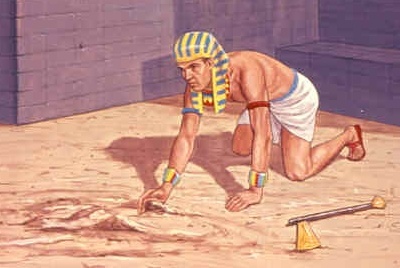 |
We are not told whether or not the Spirit constrained him to kill the man, as was Nephi when he murdered Laban (1 Nephi 4:10). Nephi's deed would most likely be called first degree murder in any modern court. He could explain how the Lord commanded him to do it, but neither he nor the Lord believed that would stand up in court, so he too had to flee. Moses shed blood, but not innocent blood, so a modern court would probably call it second degree murder. Perhaps the biggest clue that Moses's act was approved of God, or at least forgiven, was the huge power and assignments God gave Moses thereafter.
 |
The Lord defended Moses and caused Miriam's hand to wither with leprosy for seven days for such impudence. He pointed out that Moses is a cut above all of the other prophets, who have dreams or visions, because God speaks to Moses face to face (Num. 12:6-8).
 |
The law of circumcision was given to Abraham for all of his descendants to obey, at least up until the time of Christ (Moroni 8:8). Moses was well aware of this law. He married Zipporah, daughter of Jethro (Reuel), a priest of Midian. Midian was a son of Abraham, so the Midianites would have known about the law of circumcision even if Moses hadn't. When their first son was born, Moses did not have him circumcised.
When Moses left Midian at the Lord's command to return to Egypt to free his people, he took his wife Zipporah and two sons with him. En route the Bible briefly reports this incident:
And it came to pass by the way in the inn, that the Lord met him, and sought to kill him.
Then Zipporah took a sharp stone, and cut off the foreskin of her son, and cast it at his feet, and said, Surely a bloody husband art thou to me. Exo. 4:24-25
The Lord sought to kill Moses? So what was all of that about?
The Book of Jasher fills in more details:
And Moses rose up to go to Egypt, and he took his wife and sons with him, and he was at an inn in the road, and an angel of God came down, and sought an occasion against him.
And he wished to kill him on account of his first born son, because he had not circumcised him, and had transgressed the covenant which the Lord had made with Abraham.
For Moses had hearkened to the words of his father-in-law which he had spoken to him, not to circumcise his first born son, therefore he circumcised him not.
And Zipporah saw the angel of the Lord seeking an occasion against Moses, and she knew that this thing was owing to his not having circumcised her son Gershom.
And Zipporah hastened and took of the sharp rock stones that were there, and she circumcised her son, and delivered her husband and her son from the hand of the angel of the Lord. (Jasher 79:8-12)
If we accept the account in the Book of Jasher, then we see that Moses had respected the wishes of his father-in-law more than the commandment of God. Also from Zipporah's words, it seems clear that she had agreed with Jethro. So Moses had failed to obey God in order to please his wife and her family.
This was important enough that an angel of God was sent threatening Moses's life if he did not obey. That seems worth pondering because it is so unusual. How many other people had disobeyed that commandment and yet had never seen an angel? Apparently more was required of Moses because of his important mission.
Now consider the case of Joseph Smith who reportedly had similar incidents occur in his life.
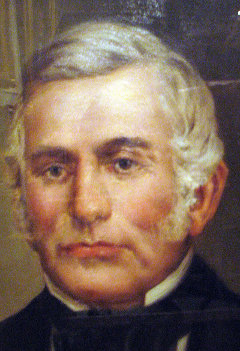 |
Both Joseph and Porter chose to flee into hiding for a few months rather than to stand trial in Missouri where they would have little chance of a fair hearing. Joseph denied any involvement and Porter was eventually tried for the attempted murder and found innocent.[11]
In 1831 the Prophet Joseph lived for a time at the home of John Johnson in Hiram, Ohio. In 1878 Orson Pratt testified that John's son Lyman told him that at that time Joseph had received a revelation about polygamy.[12] Both Orson and Lyman were members of the first Quorum of Twelve Apostles of the LDS Church and hence hopefully were credible witnesses.
Mosiah Hancock reports in his journal that his father Levi Hancock performed a wedding ceremony for Joseph to a second wife, Fanny Alger, about March 1833. She was Levi's niece and was a 17-year-old maid to Emma in the Smith home at that time. Very few knew of this marriage. Both of her parents approved the wedding and stayed faithful lifelong members of the Church. Secrecy did not prevail and after some time whispers about their union turned into a scandal. It was assumed that their relationship was adultery. In 1836 Fanny escaped an attempt to force her to testify against the Prophet. Then the Alger family left Kirtland and Fanny moved to Indiana to marry and lived there to old age.[13] She maintained to her death that her relationship with Joseph was private and none of anyone else's business. In 1838 Joseph's Assistant President of the Church, Oliver Cowdery, was tried for having accused the Prophet of adultery with her. Joseph did not deny a relationship with her, but insisted it was not adultery.[14] Joseph was found innocent of the charge and Oliver was excommunicated.
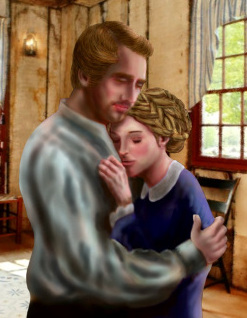 |
The charge of polygamy is what led to the murder of the Prophet shortly thereafter. Several of the church leaders were secretly practicing polygamy which they would declare openly nearly eight years later, making the practice a Church doctrine, teaching that it is a higher form of marriage. William Law had threated to expose them by name in the next issue of his newspaper, so the town council at the insistence of those apostles involved and over the objections of the Prophet,[17] voted to destroy that press, declaring it a public nuisance. Because Joseph signed the decree as mayor, he was imprisoned and then martyred on Thu 27 Jun 1844.
After the Quorum of Twelve were voted the new leaders of the Church, in 1852 plural marriage finally became public and was attributed to having begun with Joseph Smith. Several of Joseph's closest associates did not believe that Joseph had ever practiced polygamy and would not follow Brigham but started other churches instead. These included Emma Smith, Sidney Rigdon (First Counselor), William Marks (Nauvoo Stake President) and some apostles. This is stated here only to show that the case for Joseph never having practiced polygamy was strong enough that other churches were founded on that belief.
All of Joseph's private and public actions known to me which were recorded during his life appear to be totally consistent with what Fanny said: whatever happened between them was meant for them alone and never meant to become public knowledge nor to set an example for anyone else to follow.
There are several people who testified that the Prophet Joseph's life had been threatened by an angel if he failed to obey a commandment of God to take a plural wife. Apparently he had been given that command in 1831 in the revelation at John Johnson's home mentioned above. By 1833 he still had not complied. Why not? There is evidence that he had no desire for another wife, but also surely part of it was that he did not wish to offend his beloved wife Emma. That is indicated because when he finally decided to obey, he had the marriage ceremony performed in the barn away from her.
One report said Joseph had mentioned that the angel threatened him in the year of 1834 to get him to obey the commandment to marry a second wife. That is the year that many historians believe that Joseph and Fanny were married. Thus, it appears that Joseph early in his ministry delayed obeying a command from God in order not to offend his wife, even as Moses had done. These parallels between their lives are surprisingly close.
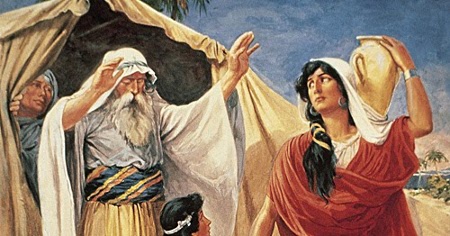 |
Sounds pretty bad doesn't it? And yet we all hear this account of Abraham rehearsed in church without so much as anyone even raising an eyebrow. Why not? Because we've all been taught that such behavior is actually okay if God commands it, and there is no doubt that Abraham was indeed a man of God.
Of course the tabloid headline might also have read: Self-proclaimed "Prophet" prevented from sacrificing son! Talk about the possibility of having one's name known for good and evil!
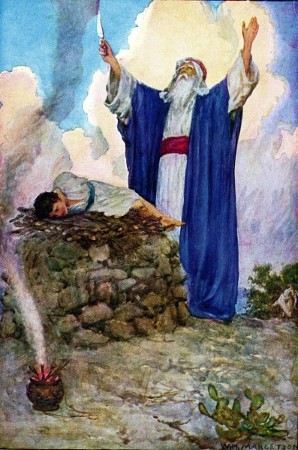 |
Now suppose that someone who knew that Abraham was indeed a man of God and had truly been commanded by God to sacrifice his firstborn son as a test of his faith, believed it to be a step in his eternal progression. What if such a person started to teach in church that God was going to sacrifice his Son someday and that it is a higher law to do so? It could be preached that all should "go and do the works of Abraham" in order to be exalted: all should sacrifice their firstborn to be truly godlike.
Now suppose this teaching sprang up right in Abraham's own church. Suppose Abraham had kept his sacrifice of Isaac a secret both because it was illegal and also because it would be misunderstood. He would vehemently teach at the pulpit that it is wrong to sacrifice a son. But what if some of his church leaders knew he had attempted such a thing so they secretly taught some members to do so, actually believing it was a step toward exaltation? If Abraham found out that his name was being used to support such a mistaken doctrine, would he not correct anyone who taught such, even if well meaning and following his example?[18]
By the way, in the days of Abraham, there were religions which indeed taught that it was a higher law to sacrifice little children. Abraham preached against this abomination during much of his life. Thus to sacrifice his promised son would have been all the more difficult a test for him. The true so-called "Abrahamic Test" is apparently to be asked to give up whatever is so precious to you personally that you might love it more than you love God. He needs to know if we truly love Him above all. For one person it might be their spouse (Luke 14:26), for another it might be to sell all that he has and give to the poor (Matt. 19:21). It is an individual test: Abraham did not need to sell all that he had and give to the poor.
That may be analogous to what happened with Joseph Smith. Perhaps it is as Frances Custer (Fanny Alger) said toward the end of her life, the relationship between the Prophet Joseph and her was strictly personal and none of anyone else's business. Whether or not Joseph understood that at first,[19] it now appears that it was not meant to be an example for all, any more than was Abraham's marriage to Sarah's maid nor the attempted sacrifice of his son.
Now let us return to look at the symbolism of the constellations, the date of the martyrdom of Joseph Smith, and the possibility that both Moses and Joseph Smith atoned as best they could for the sins of their people.
 |
The ram most likely represented Jesus Christ, who atoned for the sins of all who would repent and come unto Him. Moses also attempted to atone for the sins of his people, after they built and worshipped a golden calf while he talked with God. He said that he would go back and talk to the Lord so that perhaps he could atone for their sin. His attempt was so serious that he asked that if they could not be forgiven that his own name be blotted out of the Lord's book (Exo. 32:30-32). Truly he loved his people and would do as much as possible to be a savior for them. Even though Moses was not sacrificed, there is a possibility that the ram represented Moses and his atonement for his people.
So what about the bull? Did the bull represent a person? The Bull (Taurus) is the constellation of Joseph of Egypt, in the sense that each of the twelve sons of Jacob were identified with one zodiac figure. It is here suggested that the sacrificed bull represented Joseph Smith, the Messiah ben Joseph, who would be sacrificed as an offering to atone for the sins of his people. His principal star is at the eye of the Bull.
Before his final incarceration, Joseph had escaped and was fleeing to the West to prepare the way for his people to follow. When he got word that he was being called a coward and that the whole city of Nauvoo was being threatened to be attacked by enemies if he did not return to turn himself in, he allegedly replied that if his life was of no worth to his people, then it was of no worth to himself. He returned to be martyred to save his people. It could be said that he was attempting to atone for his people. Note that the bull sacrificed was to be without blemish, implying that Joseph Smith was considered unspotted with sin in the eyes of God.
Why was a bull sacrificed on the Day of Atonement in the law of Moses? Neither Jesus Christ nor Joseph Smith met their demise on that autumn day. Again, it has been shown in my work that the day on the Hebrew Calendar on which Joseph Smith died (10 Tammuz) completes a set of four "days of atonement" with one every three months in each season.[20] Joseph's was in the summer. The other three days were already holy days on the Hebrew Calendar, but not the one in the summer. Many of the holy days were not recognized until some big event occurred on them, such as the Feast of Lights (Hannukah) and the Feast of Esther (Purim). It is the same with the martyrdom of Joseph Smith; it was not recognized as a holy day until that event. Joseph Smith was sacrificed on the summer equivalent of the Day of Atonement!
In the law of Moses, two lambs were sacrificed every day: one in the morning and one in the afternoon (Num. 28:3-4). Early in my work it was suggested that these two lambs represent the Messiah ben Judah and the Messiah ben Joseph. That is, the lamb sacrificed in the morning represented Jesus Christ. The Hebrew day begins at sunset, so the morning represents the meridian of time for the 24-hour cycle of the day. Christ would be sacrificed in the meridian of time. The afternoon represents nearing the latter time of the daily cycle. What sacrifice would there be near the end of history that would be worth commemorating daily with the sacrifice of a lamb? Joseph Smith said just before his death that he went like a lamb to the slaughter and was free of offense against God or any man (D&C 135:4). It still appears that the daily afternoon sacrificed lamb represented Joseph Smith, the Messiah ben Joseph![21]
Moses prophesied of two great prophets who would come after him: one was the Messiah ben Judah who would be Jesus Christ of the tribe of Judah, the Savior of all who would come unto Him, who should be hearkened to in all things. The other would be the Messiah ben Joseph of the tribe of Joseph, who should be obeyed only when speaking the words that the Lord gives to him. It is proposed this latter prophet was Joseph Smith. It is shown that there are close parallels between the lives of Moses and of Joseph Smith. Both were lawgivers who spoke to God face to face, both would be given a spokesman, and both would attempt to atone for the sins of their people. Moreover, both would also be accused of sin, namely of murder, of having an illegal marriage, and of breaking a commandment of God to the extent that an angel was sent to demand obedience on threat of death. Indeed, the parallel is so close that Moses could be called the Messiah ben Levi, the tribe of his birth. It is also noted that it has been proposed earlier that both Moses and Joseph Smith are among the seven chief angels of God. Truly both of these giants among men were given great missions to be leaders and even saviors of the people of God.